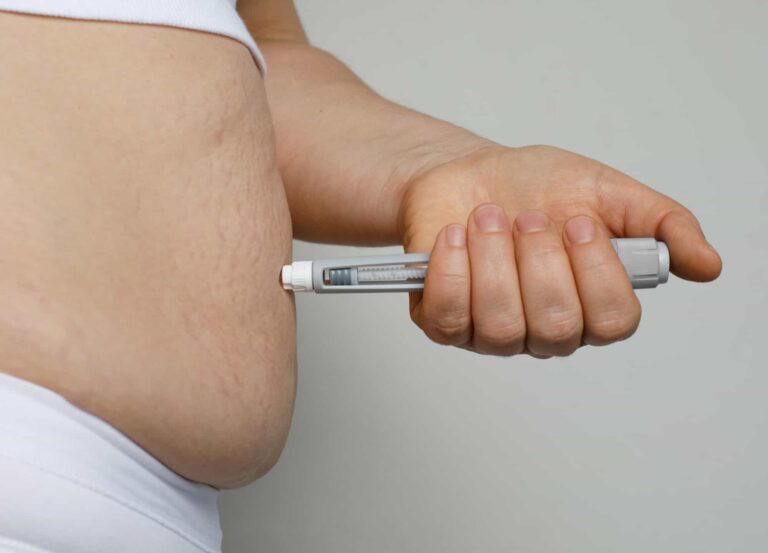Weight-loss procedures were performed as early as the 10th century—yes, really—but it was in the mid-1990s that they became much more common. In fact, recent surveys show that more than 250,000 bariatric surgeries are performed annually in the United States—a statistic that’s quite close to the number of breast augmentations (the country’s most popular cosmetic procedure) performed stateside every year.
Despite this, weight-loss surgery seems not only more stigmatized but also subject to more misinformation than most procedures. These alternative ideas range from more minor beliefs, such as that there’s only one form of bariatric surgery, to more harmful concepts, like it’s the riskiest form of surgery and can even cut years off your life after recovery.
The truth is that bariatric surgery is a life-changing—and, in some cases, lifesaving—option for those who qualify. Here, Dr. J. Timothy Katzen, a board-certified plastic surgeon in Beverly Hills, California, and the president of the American Society of Bariatric Plastic Surgeons (ASBPS), helps us debunk some of the most frequently heard myths about weight-loss surgery.
Myth #1: Bariatric surgery is a “miracle cure” for weight loss
Some people think that weight-loss surgery acts as a neutralizer for bad habits—like you can eat as unhealthily as you want because your newly smaller stomach will make it harder for you to overeat. But bariatric surgery should be viewed as a tool, not a solution. “Like any tool, it is only as good as your efforts to maximize its effects,” says Dr. Katzen. A healthy lifestyle, including eating nutritiously and following a consistent fitness routine, is paramount to a successful outcome and sustained weight loss. Otherwise, you’re just cheating yourself. “If you fail to follow the proper nutrition guidelines or fail to exercise, you can undo the benefits of bariatric surgery,” warns Dr. Katzen.
Myth #2: Stomach stapling is the only kind of weight-loss surgery
“Stomach stapling,” a form of bariatric surgery that physically separates a large part of the stomach from a smaller section with staples (thus reducing the amount of food it can hold), is an outdated method. It led to a lot of side effects, like severe acid reflux, so stapling has mostly been replaced by gastric banding, also known as the Lap-Band. This band divides the stomach into two sections: A smaller upper stomach, where food is held (and makes you feel fuller faster), and a larger lower stomach that digests the food.
This is a fairly simple and safe procedure, with a faster recovery time and smaller scar than from bigger procedures, like a gastric bypass. However, it comes with two disadvantages. “You will need to get the band adjusted, to further restrict your stomach size and, therefore, decrease stomach absorption,” says Dr. Katzen. That’s definitely a downside for those uninterested in booking follow-up procedures. Additionally, the post-procedure weight loss is not as dramatic as that from other bariatric surgeries, so if you’re seeking more significant change, other forms may be better for you.
One of the most well-known options is gastric bypass, formally known as Roux-En-Y surgery. During this procedure, a surgeon creates a small pouch from the stomach and directly connects it to the small intestine. Gastric bypass offers dramatic and rapid weight loss (within the first six months!) that can continue for up to two years. However, because it changes the way you absorb nutrients, you may become malnourished as well as experience low levels of hemoglobin and calcium (causing anemia and osteoporosis, respectively). Another concern is the unfortunately, though aptly, named dumping syndrome. “Dumping syndrome is a side effect where the stomach dumps too much food into the intestines and causes diarrhea,” Dr. Katzen explains.
There are further surgical options as well as a nonsurgical procedure—the gastric balloon. Your provider inflates a balloon in your stomach, which stays in place only for about six months. There are plenty of bariatric procedures to consider; your provider will best be able to tell you which is most suitable for your weight-loss goals.
Myth #3: Weight-loss surgery is unaffordable
Not true—in fact, Dr. Katzen remarks that most bariatric surgery is covered by health insurance. If you have a high BMI; suffer from obesity-related health issues like diabetes, hypertension, heart strain, and joint issues; and work with your insurance provider to complete the required preoperative weight-loss counseling, the odds are high that your procedure will qualify for coverage.
If you don’t qualify, you still have options. Remember, there are many factors that can cause the cost of bariatric surgery to vary, so be sure to take those into account. And beyond paying cash, you can also carefully budget and work with lenders like CareCredit to finance your weight-loss surgery. “Remember, this is your life—it is critical that you devote all your efforts and resources to extend your life and to improve the quality of your life and health,” urges Dr. Katzen. “Do whatever it takes to obtain the funds necessary to proceed with your lifesaving bariatric surgery.”
Myth #4: You have to be morbidly obese to be a candidate for weight-loss surgery
Morbid obesity is an antiquated (and offensive) term. Obese BMI levels are now categorized as Class 1 (30 to 34.9), Class 2 (35 to 39.9) and Class 3 (40 or higher). This statistic is determined by a height and weight calculation; you can find a BMI calculator here. Prospective patients typically must have a BMI of 40 or greater—or 35 with a comorbidity—to qualify for a bariatric procedure.
However, eligibility for insurance coverage for weight-loss surgery falls under different qualifications. “Insurance companies have strict criteria for them to permit payment and coverage for the procedure,” says Dr. Katzen. While some insurance companies have more stringent policies, “most insurance companies require an elevated BMI and associated comorbidities, such as diabetes and hypertension,” he adds. Until you go through the submission process, you may not know if you qualify under your insurance provider’s plan. You’ll have to work with your bariatric surgeon and their team to document your health conditions and file a letter of medical necessity; ultimately, your insurance company makes the final determination.
Myth #5: Weight-loss surgery is dangerous
All forms of major surgery, whether reconstructive, cosmetic, or for weight loss, are inherently risky; a few factors, in particular, increase those risks. “The more obese you are, the more comorbidities you have, the more invasive the procedure, and the less experienced your weight-loss surgeon, the more likely that complications can occur,” says Dr. Katzen. Generally speaking though, the benefits of surgery supersede the health risks of being overweight.
When seeking a surgeon, it’s critical to find one with a great deal of experience in performing your specific procedure; they should operate in a surgery center that’s been accredited as a “center of excellence in bariatric surgery” or in a hospital. And while there are some truly exceptional weight-loss surgeons abroad, most frequently in Mexico, Dr. Katzen still advises getting your surgery stateside. “The main problem with having bariatric surgery outside the USA is the follow-up,” he warns.
Due to the complex nature of weight-loss surgery, attending your follow-up appointment is important—and if you’re experiencing a complication and your MD is abroad, it may be impossible to see them. “In an emergency, [it’s possible that] the exact surgery or what was done can’t be determined because it was performed outside the USA,” he adds. It’s also worth noting that the majority of insurance providers won’t cover the fees incurred by complications created elsewhere.
Myth #6: Bariatric surgery is purely a cosmetic procedure
Weight-loss surgery may change the appearance of a patient, but it’s not a cosmetic surgery at all. “Cosmetic procedures are procedures performed on healthy patients,” says Dr. Katzen. They also are elective and, unlike bariatric surgery, don’t typically qualify for health insurance coverage (though there are exceptions). “Weight-loss surgeries are performed because patients have a disease—namely, obesity,” explains Dr. Katzen.
Myth number #7: Most people gain back all the weight they’ve lost from their surgery
Remember, bariatric surgery is a tool, not a quick fix, and weight regain post-procedure greatly depends on the patient’s dedication to maintaining a healthy lifestyle. The type of weight-loss surgery performed also plays a part, as do genetics, age, and activity. But ultimately, “the surgery itself will not make you permanently lose weight,” cautious Dr. Katzen. “Weight-loss maintenance is a team effort between you and your bariatric surgery procedure that requires your constant cooperation.”
That said, the figures related to weight regain are comforting. According to Dr. Katzen, regardless of the patient or procedure, only 15—20% of patients regain 20% of their lost weight. “Most patients do not regain all their weight,” he says. If you do, however, you can always have your procedure revised or try a different one.
Myth #8: Other than the improvement to your weight, bariatric surgery has a negative effect on long-term health
Some people believe that weight-loss surgery makes it impossible to get pregnant (false) and can take years off your life. That’s not the case—what will take years off your life are the health conditions associated with obesity, like diabetes, high blood pressure, and osteoarthritis. Bariatric procedures cause weight loss and can wholly eliminate some of those dangerous health issues. And beyond the improvement to your health, it can also dramatically transform your quality of life and self-esteem for the better. “The side effects far outweigh the benefits achieved by significant weight loss,” notes Dr. Katzen











